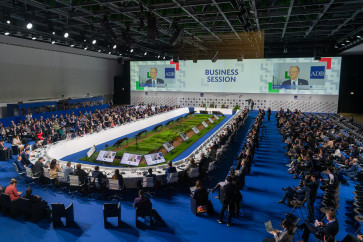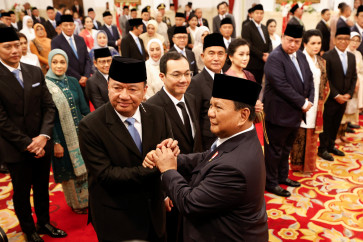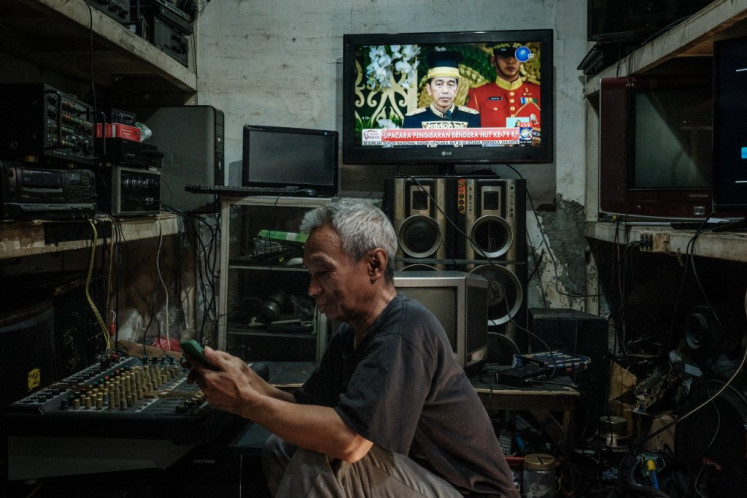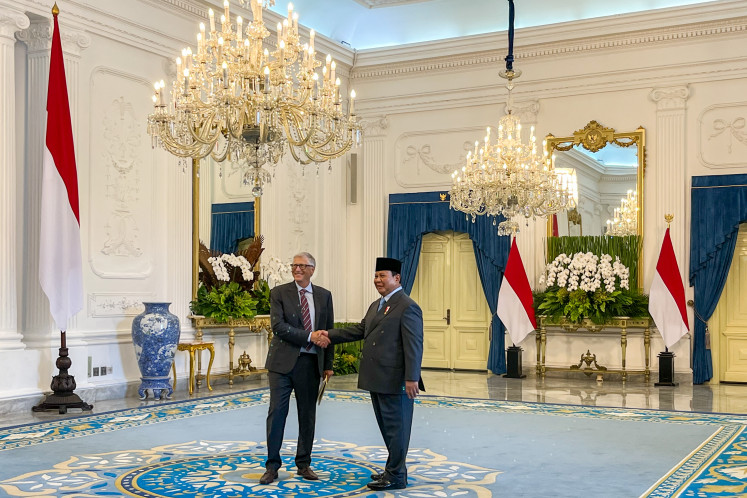A film that does more disservice to Sukarno
Never a movie buff, I had no intention of watching Soekarno, after so many bad press reviews and protests, including from his family, griping about the filmâs failure to portray the man, who proclaimed Indonesiaâs independence in 1945, the way he should be
Change text size
Gift Premium Articles
to Anyone

N
ever a movie buff, I had no intention of watching Soekarno, after so many bad press reviews and protests, including from his family, griping about the film's failure to portray the man, who proclaimed Indonesia's independence in 1945, the way he should be.
For a great, complex and controversial figure like Sukarno, I don't think his story can ever be told in a movie of a little more than two hours. You can never do him justice and instead, as with this movie, you end up picking up the aspects you think are most important, but not necessarily what others
believe.
I changed my mind as soon as I heard of a campaign to have the Film Censor Board remove Soekarno, which premiered in Jakarta on Dec. 11, from movie houses. There were even talks of a 'sweeping' campaign to stop cinemas from screening it.
I had to watch it before it was too late.
I came away shocked at the way Sukarno's reputation has been destroyed in the able hands of producer Hanung Bramantyo. Sukarno had many flaws, but I am not sure whether this is how the nation wants him portrayed in a movie.
But I have to keep reminding myself that this movie, about Sukarno's life from his younger years to the time he read the proclamation text in August 1945, never had the pretension to be a documentary. It's a commercial movie.
Here are some dangerous impressions I had of Sukarno after watching the movie:
'¢ He was a womanizer. He flirted with a student in a school where he taught even while he was still a married man (and why does this sound familiar today?).
'¢ He was so naïve to believe in the promises of the Japanese military of an eventual independence for Indonesia that he was willing to collaborate in full, from providing prostitutes for the Japanese soldiers, securing rice supplies from Chinese shops for them, to supplying young men to work as forced laborers or romusha.
'¢ While the movie succeeded in showing the dynamics between Sukarno, Mohammad Hatta and Sjahrir engaging in intellectual debate about strategy to achieve independence, one couldn't help feeling Sukarno was constantly being outsmarted by the other two.
It is debatable the extent to which these were real, for movies (and not documentaries) have the luxury of exaggerating or dramatizing facts for impact.
Sure, there were moments in the movie that showed Sukarno at his finest moments, particularly when he was portrayed as a great orator from a very young age.
He was shown defending himself before a court as the Dutch colonial administration tried to silence him and later sent him to exile. He delivered that famous speech in 1945, before a rowdy meeting of the preparatory committee for independence, in which he broached the five principles of Pancasila for the as-yet-to-be-established republic.
The time constraint meant that the audience was rushed to seeing the progression of Sukarno from his childhood to becoming a political orator whom the colonial government regarded as a threat that it put him in jail.
A lot of the time in the movie was dedicated to his love life and his relationship with wife Inggit, and later with his student Fatmawati, whom he married afterwards. Since Sukarno married a few other women later in his life, this aspect of his life probably belongs to a separate film.
But Soekarno deprived us of one important aspect of his life: His intellectual growth and development. Anyone familiar with his speeches and press articles he wrote in the 1920s and 1930s knows that he had one of the finest intellectual capacities of any young Indonesians at the time (and probably
since).
This aspect was completely missing that anyone watching the film could justly but erroneously conclude that he was the lesser intellectual compared to Hatta and Sjahrir.
Understandably, the Sukarno clans became the first group to openly object to the movie but strangely enough, their objections were reportedly over Hanung's choice of actor to play Sukarno, and not over the content. Didn't they read the script at all?
Even stranger was the protest coming from Muslim groups, including Muhammadiyah and the Islam Defenders Front (FPI), who objected to the portrayal of a Muslim speaker shouting his demand for the use of sharia in the new republic during the meeting of the independence preparatory committee.
They claimed the meeting was a lot calmer and not rowdy as the movie showed. If they had read their history, they would have learned that it took days for the committee to settle this fierce debate, and Sukarno ended it once and for all with his Pancasila speech.
The movie may be an oversimplification and may have dramatized the event a little, but it is a true reflection of the debate, which incidentally still carries on today, and often as rowdy as it was back then.
Their protests, and the threat of sweeping, certainly gave me a sense of urgency to watch the movie. I wonder whether this was a marketing ploy to boost the movie's box office?
But those who are not content with the movie should not try to censor or ban the film.
The Sukarno clans, the staunch Sukarno fans, the Muslim groups and historians who are concerned about getting history right, should be thinking about coming up with their own versions of a Sukarno movie and show him in different lights.
The more the merrier. He was a complex and controversial figure, as well as a great one.
The writer is senior editor of The Jakarta Post.









